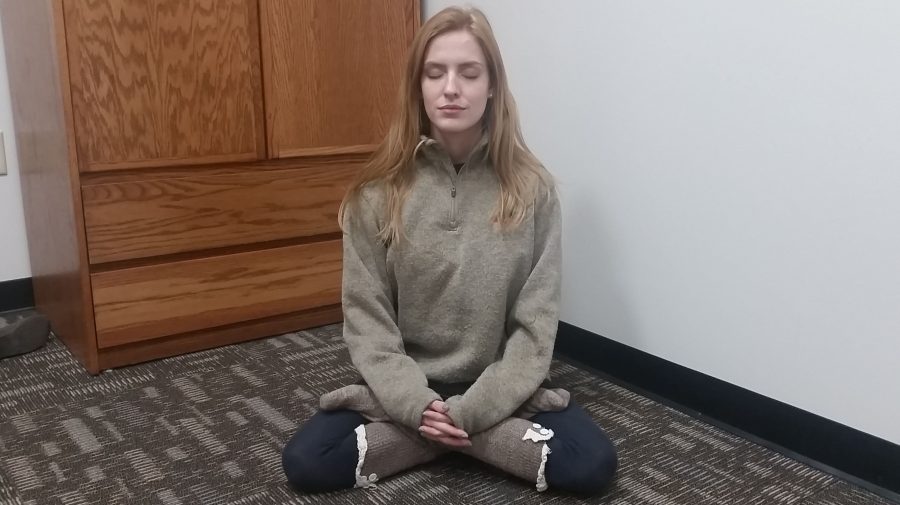LINDSEY FIALA | Online Editor
Meditation can be done by sitting with crossed legs on a firm yet plush pillow in a dimly lit room.
The hums and hollow ringing of a singing bowl fill people’s ears as their eyes gently shut. They breathe in deeply, taking a moment to notice how it feels to have their lungs completely filled with air.
They slowly exhale, count to five and then repeat.
They rest their hands comfortably in their laps and notice how it feels to be present in this very moment.
“[Meditation] brings me focus and gives me a relaxing place to focus on the obstacles in my life calmly and methodically,” said Jessie Basler, member of the Meditation Association at Lindenwood.
Natalie Turner-Jones, an ordained Buddhist minister and avid meditator for nine years, believes that meditation can be a useful tool in taking care of oneself, especially for college students.
[perfectpullquote align=”left” cite=”” link=”” color=”” class=”” size=””]For the average college student, a lot of the time it’s go go go. They never sit back and just exist.
-Evan Collins[/perfectpullquote]
“Meditation helps [college students] to deal with stress,” Turner-Jones said. “Between the ages of 18 and 25, the prefrontal cortex is finishing its development in the brain, and the studies and research that have been done over the last 30 years have shown us that meditation helps to build the prefrontal cortex,” Turner-Jones said.
In a 2011 Harvard study, participants spent an average of 27 minutes a day meditating for eight weeks. Researchers found that it lowered their stress and anxiety, which are major mental health issues for college students.
“Although the practice of meditation is associated with a sense of peacefulness and physical relaxation, practitioners have long claimed that meditation also provides cognitive and psychological benefits that persist throughout the day,” Sara Lazar wrote in a 2011 article. Lazar is a study senior author of the Massachusetts General Hospital Psychiatric Neuroimaging research program and instructor in psychology at Harvard Medical School.
Co-founder of Lindenwood’s Meditation Association Evan Collins said it is important for people to learn tools to help avoid stress and anxiety. He believes that it is important for students to partake in 15 to 30 minutes of meditation every day.
“For the average college student, a lot of the time it’s go go go,” he said. “They never sit back and just exist.”
Turner-Jones said meditation has likely been around since before written history and became popularized with the adoption and spread of Buddhism.
Buddhism is a discipline of practice and spiritual development, which helps to find insight of nature and reality, according to thebuddhistcentre.com. Buddhists meditate to continually develop their awareness, kindness and wisdom.
Monks focus on the cultivation of a calm and positive state of mind, and they approach this in their own personal ways.
Turner-Jones offers 30-minute-long meditation sessions for students on Tuesdays, Thursdays and Fridays at noon in the VIP Green Room in the J. Scheidegger Center, welcoming anyone to participate.

Illustration by Kat Owens
During these sessions, Turner-Jones guides students through zen meditation.
“[Zen meditation] is really simple,” Turner-Jones said. “Essentially what you are doing is cultivating awareness of your breath.”
Turner-Jones prefers to meditate in a quiet, low-lit room. She will sit either on a pillow or on the edge of a sturdy chair, which helps straighten the spine.
“It sounds really simple, but the truth of it is that it is a little more complicated because then you start watching your breath, and then all kinds of things start to happen,” Turner-Jones said.
The Meditation Association mainly practices meditation that focuses on emotional well-being, Collins said.
The club meets at 6 p.m. every Monday in Room 13 on the first floor of Spellmann Center, where they mostly practice stabilizing meditation, a form of meditation that focuses on a specific word, scene or mantra.
A mantra is a word or sound that is repeated by the meditator, either internally or out loud, that helps with concentration during meditation.
“It’s different for everyone, what they think about,” Basler said. “I think about nature a lot and pretend I’m walking through the woods.”
Collins said that one of the biggest reasons people become discouraged from meditating is because they are over-complicating it.
“People have this strange, idealized version of meditation,” Collins said. “They look at these yogis and monks, and they think, ‘Wow these monks look so serene and peaceful, sitting there not thinking about anything,’ which isn’t the case.”
A problem people run into while meditating is thinking too much and being hard on themselves for getting caught up in their thoughts.
“You’re always thinking, because that is the normal function of the brain,” said Collins. “You just have to let those thoughts be and be able to think them through.”
Collins said to help guide thoughts in meditation, it helps to focus on breathing in and out and how that feels throughout the body.
[perfectpullquote align=”left” cite=”” link=”” color=”” class=”” size=””]The sooner we are able to cultivate [mediation as a] habit, the healthier we will be in the long run.
-Natalie Turner-Jones[/perfectpullquote]
“Then you can focus on the other aspects of your body, like the blood flowing through your veins and the warmth of your body,” Collins said.
When Turner-Jones gets caught up in her thoughts during meditation, she focuses on counting her breaths as a distraction.
“I will sometimes have that problem where I will sit, and I just can’t not think,” Turner-Jones said. “The only problem with thinking is if we get caught by it. [We should think] of us anchoring ourselves in the body, and putting the thoughts out here, like a little parade.”
According to zenhabits.net, starting out with a simple two-minute meditation every day is the best way to form the habit. After that, try five minutes. If five minutes becomes a habit, try 10 minutes. The longer meditating is a habit, the easier it will be to meditate longer.
“This happens because as the nervous system relaxes, it simultaneously begins to focus itself, and the more that happens, the more it’s going to want that to happen,” Turner-Jones said. “Because it begins to develop a positive association with it, it becomes easier to sit for longer.”
Anyone can meditate, and both Collins and Turner-Jones agree that meditation is an important habit to incorporate in people’s daily lives.
“Create that as a habit, you recognize the need to pause and recenter,” Turner-Jones said. “The sooner we are able to cultivate that habit, the healthier we will be in the long run.”










